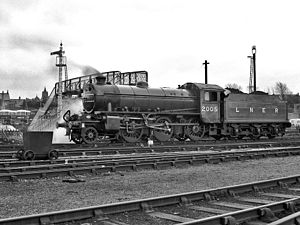LNER Thompson/Peppercorn Class K1
This article includes a list of general references, but it lacks sufficient corresponding inline citations. (December 2016) |
| LNER Thompson/Peppercorn Class K1 | |||||||||||||||||||||||||||||||||||||||||||||||||||||
|---|---|---|---|---|---|---|---|---|---|---|---|---|---|---|---|---|---|---|---|---|---|---|---|---|---|---|---|---|---|---|---|---|---|---|---|---|---|---|---|---|---|---|---|---|---|---|---|---|---|---|---|---|---|
 Preserved loco No. 62005 (as "2005") at Carnforth | |||||||||||||||||||||||||||||||||||||||||||||||||||||
| |||||||||||||||||||||||||||||||||||||||||||||||||||||
| |||||||||||||||||||||||||||||||||||||||||||||||||||||
| |||||||||||||||||||||||||||||||||||||||||||||||||||||
| |||||||||||||||||||||||||||||||||||||||||||||||||||||
The London and North Eastern Railway (LNER) Class K1 is a type of 2-6-0 (mogul) steam locomotive designed by Edward Thompson. Thompson preferred a simple two-cylinder design instead of his predecessor Nigel Gresley's three-cylinder one. The seventy K1s were intended to be split between the North Eastern Region of British Railways and the Eastern Region of British Railways.
Prototype[edit]

LNER Class K4 number 3445 MacCailin Mor was rebuilt in 1945 at Darlington Works as a two-cylinder prototype of the K1 class, designated K1/1. Thompson entrusted the rebuilding of No. 3445 as a two-cylinder Mogul to his principal assistant Arthur Peppercorn. This locomotive became British Railways No. 61997, and was withdrawn from service in 1962.
Production[edit]
When Peppercorn replaced Thompson as chief mechanical engineer, he made the rebuilding the basis for a new class of 2-cylinder 2-6-0. Several modifications were made. The running plates were redesigned to improve access to the cylinder steam chests and there were changes to the leading pony truck, the cylinder linings and the boiler. The new engines were also longer and received larger tenders that held 4,200 gallons of water instead of the K4's 3,500 gallon tenders.
An order for 70 of the new mixed traffic 2-6-0s was placed with the North British Locomotive Company of Glasgow. They were the last steam locomotives built to an LNER design, although all were delivered under British Railways auspices. Numbered 62001–62070 they entered service between May 1949 and March 1950.
Operation[edit]
The Peppercorn K1s proved to be useful and versatile engines. They worked extensively over ex-LNER territory but were chiefly associated with North East England, and like their K4 predecessors, the West Highland Line. Like many post-nationalisation classes, the K1s had relatively brief lives. All were withdrawn between 1962 and 1967, but the last to be retired was ultimately preserved. They were capable of reaching speeds of up to 50 miles per hour, or 45 miles per hour while running tender first.[1]
Preservation[edit]

One example of the class, No. 62005, which was also the final member in service before its withdrawal, has been preserved, and is based at the North Yorkshire Moors Railway. It was acquired as a source of a spare boiler for the solitary preserved K4, but in 1972, the K1 was donated, still with its boiler, to the North Eastern Locomotive Preservation Group. It was also used as a stationary boiler at ICI North Tees Port Clarence Works for a period of 6 weeks.[2] It was eventually placed into storage at Neville Hill where it was later obtained by Viscount Garnock, Geoff Drury, George Nissen, and Brian Hollingsworth as a spare boiler for the sole surviving member of the Gresley K4 moguls 61994 The Great Marquess. The plans for the stationary boiler fell through and the locomotive was eventually purchased by the 45428 Stanier Class 5 Locomotive Society Ltd and was later donated to the NELPG.[3][4]
By 1975, the K1 had been restored to main line running order and made an appearance at the Stockton and Darlington Railway 150th-anniversary celebrations at Shildon, County Durham. Since then the NELPG has endeavoured to keep the locomotive available for use on the main line. While it is usually based on the North Yorkshire Moors Railway, 62005 spends most of its time on the summer Fort William-Mallaig Jacobite service (numbered as 2005 in 1988 at least), recalling memories of the K1s in Scotland.
The locomotive spent much of its early time in preservation numbered 2005 and in LNER apple green livery. This livery is not historically accurate, as the engine was built in 1949 after nationalisation and never had this livery when in service. It was repainted in BR lined black as No. 62005 in the late 1990s, and wears this livery to date.
In 2005, it carried the name previously carried by K4 61996 (LNER 3444) Lord of the Isles during its service hauling The Jacobite for the West Coast Railway Company.[5][6]
References[edit]
- ^ Lloyd, Martin (13 February 2009). "History of K1 class locomotive 62005 Lord of the Isles". North Eastern Locomotive Preservation Group. Retrieved 19 September 2020.
- ^ Widdowson, Keith (2015). Riding Yorkshire's Final Steam Trains: Journeys on BR's North Eastern Region. The History Press. ISBN 978-0-7509-6416-6. OCLC 911957536.
- ^ Marsden, Richard. "The Thompson K1/1 and Peppercorn K1 2-6-0 Moguls". LNER Encyclopedia. Winwaed Software Technology LLC. Retrieved 29 September 2020.
- ^ "62005". Preserved British Steam Locomotives. WordPress.com. Retrieved 29 September 2020.
- ^ Hirsch, Oren. "West Coast Railway Company". Oren's Transit Page. Retrieved 30 October 2020.
- ^ Marshall, Patrica. "The Jacobite". West Coast Railways. Retrieved 30 October 2020.
- Boddy, M. G.; Neve, E.; Tee, D. F.; Yeadon, W. B. (September 1982). Fry, E. V. (ed.). Locomotives of the L.N.E.R., part 6A: Tender Engines - Classes J38 to K5. Kenilworth: RCTS. ISBN 0-901115-53-3.
- Ian Allan ABC of British Railways Locomotives, part 4 (Summer 1961 ed.). pp. 33–34.[full citation needed]
- "The Thompson K1/1 and Peppercorn K1 2-6-0 Moguls". LNER Encyclopedia.
